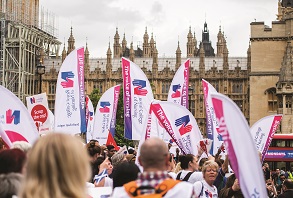Most unions back pay deal
The 14 NHS unions revealed the results of member ballots on the deal, which will broadly see a pay rise of at least 6.5% over three years. Some staff could receive up to 29% over three years and the deal as a whole aims to improve recruitment and retention.
The Treasury has pledged to fund the deal – said to cost £4bn – in full and not from existing NHS funds. Equivalent funding will be available for the devolved administrations, though it will be up to each how it is spent.
Under the deal in England, the pay bands will be simplified by removing pay points at the bottom of current pay bands that overlap with a lower band.
NHS Employers was pleased the proposals had been accepted. It said the deal would have to be formally ratified by the NHS Staff Council (which is due to meet on 27 June) and the increases would be included in July pay packets. The pay rise will be backdated to 1 April and paid in either July or August. Resources to help employers implement the deal will be published shortly.
The Royal College of Nursing said 77% of its members voted for the deal. However, chief executive Janet Davies said the battle on pay was far from over.
‘After today, the government cannot assume that the thorny issue of NHS pay has been put to bed. This deal marks a move in the right direction but the bigger leap to truly fair pay still needs to be taken. However, it does give a genuine pay rise to over one million people and that cannot be underestimated in challenging economic times.
‘We will turn our campaigning fire on getting this pay rise extended to nursing staff in other parts of the NHS and social care too. The care sector already suffers from high staff turnover and so pay there must be boosted if we are to prevent a nursing exodus for better paid jobs in hospitals and the community.’
Unison members voted 84% to 16% in favour of the deal, while it was backed by 79% of Unite members. Unison head of health Sara Gorton said: ‘The lifting of the damaging 1% cap on pay will come as a huge relief for all the employers who’ve struggled for so long to attract new recruits and hold onto experienced staff.’
She added: ‘But this three-year pay deal must not be a one off. Health workers will want to know that ministers are committed to decent wage rises across the NHS for the long term, and that this isn’t just a quick fix. Most importantly, the extra funding means the pay rise won’t be at the expense of services or patient care.’
However, there has been some criticism of the deal. The GMB is the only one of the 14 NHS unions that rejected the proposals when they were launched in March. Its members were unhappy with the deal, with 87% turning it down. The union said the agreement would mean a real-terms pay cut – it pointed out that the Office for Budget Responsibility forecasts inflation (measured by the retail price index) to rise by 9.6% over the next three years.
GMB general secretary Tim Roache said: ‘After a nearly a decade of pay pinching, the prospect of a further three years of cuts to wages is unacceptable. GMB members have sent a clear message to Jeremy Hunt – it’s a no from us.’
Related content
We are excited to bring you a fun packed Eastern Branch Conference in 2025 over three days.
This event is for those that will benefit from an overview of costing in the NHS or those new to costing and will cover why we cost and the processes.